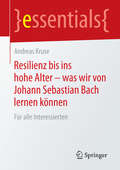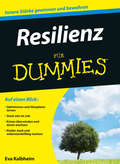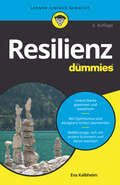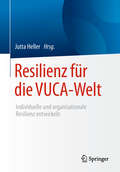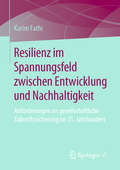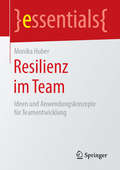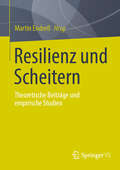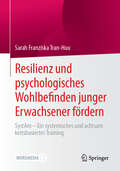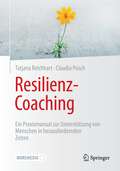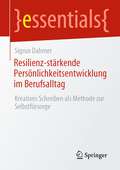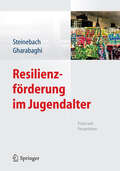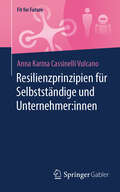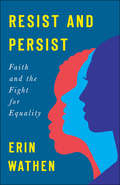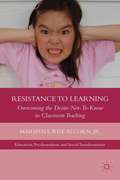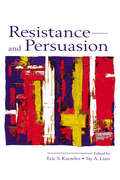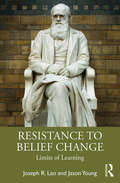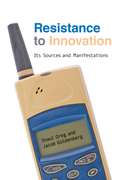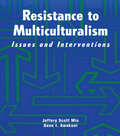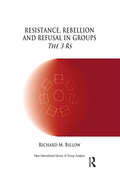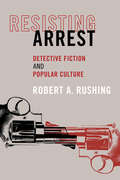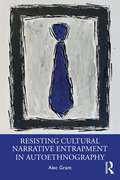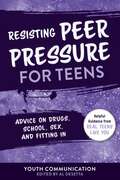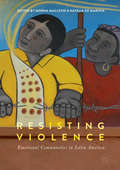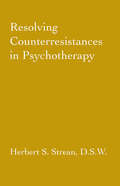- Table View
- List View
Resilienz bis ins hohe Alter - was wir von Johann Sebastian Bach lernen können: Für alle Interessierten (essentials)
by Andreas KruseDie Biografie Johann Sebastian Bachs wird unter dem Gesichtspunkt der Resilienz betrachtet: Wie ist es dem großen Komponisten gelungen, trotz zahlreicher Verluste, Rückschläge und Grenzsituationen sein außerordentliches schöpferisches Potenzial zu entfalten? Inwieweit sind Bezüge zwischen der Entwicklung in verschiedenen Lebensabschnitten und einzelnen Werken erkennbar? Lässt sich das Leben Bachs selbst als ,,Werk" interpretieren? Nach einem Überblick über psychologische Resilienzforschung werden der frühe Verlust seiner Eltern, der Tod seiner ersten Frau und die von gesundheitlichen Einschränkungen und dem Verlust der Sehfähigkeit geprägte letzte Lebensphase Johann Sebastian Bachs untersucht. Dabei wird deutlich, dass es ihm bis ans Ende seines Lebens gelungen ist, sein schöpferisches Potenzial in seinem Werk wie auch in seiner Lebensführung zu verwirklichen, wobei seiner religiösen Bindung besondere Bedeutung zukommt.
Resilienz für Dummies
by Eva KalbheimDie innere Stärke eines Menschen hilft ihm, mit widrigen Umständen gut fertig zu werden. Wenn Sie aufmerksam in sich hineinhorchen, werden Sie immer wieder zu Ihren Ressourcen zurückfinden, auch wenn Sie unter Druck stehen oder sich gestresst fühlen. Die Autorin erläutert, dass Resilienz ein Faktor ist, der in der Kindheit angelegt wird, aber auch im Erwachsenenalter gefördert werden kann. Sich auf seine innere Stärke zu konzentrieren und Kinder so zu erziehen, dass sie resilient durchs Leben gehen, kann man lernen: Anhand von zahlreichen Beispielen aus verschiedenen Lebenslagen und einfach durchzuführenden Übungen zeigt die Autorin, wie Sie Ihre innere Stärke kennenlernen und festigen. Schwierige Situationen, Rückschläge, Misserfolge, Krisen und Katastrophen können so besser gemeistert werden.
Resilienz für Dummies (Für Dummies)
by Eva KalbheimResilienz kann man lernen! Lassen Sie sich von Dr. Eva Kalbheim zeigen, wie Sie mithilfe von innerer Stärke und seelischer Widerstandskraft gelassener und souveräner mit belastenden Lebensumständen umgehen. Resilienz hilft Ihnen, immer wieder zu Ihren Ressourcen zurückzufinden, auch wenn Sie unter Druck stehen oder sich gestresst fühlen. Anhand von zahlreichen Beispielen aus verschiedenen Lebenslagen und einfach durchzuführenden Übungen zeigt die Autorin, wie Sie Ihre innere Stärke kennenlernen und festigen und so schwierige Situationen, Misserfolge und Krisen besser meistern.
Resilienz für die VUCA-Welt: Individuelle und organisationale Resilienz entwickeln
by Jutta HellerVUCA (volatility, uncertainty, complexity, ambiguity) bestimmt unsere Umwelt, im privaten wie im Unternehmenskontext. Krisen stehen auf der Tagesordnung, so dass Krisenantizipation,Anpassung, Regeneration von und Lernen aus der Krise immer wichtiger für eine erfolgreiche Lebens- und Arbeitsgestaltung werden. Diese Krisenkompetenz heißt Resilienz. Coachs, Führungskräfte und UnternehmerInnen erhalten in diesem Sammelband einen umfassenden Überblick über die Herangehensweisen an Resilienz. Denn Resilienz ist einerseits die Fähigkeit, flexibel mit Krisen und Dauerbelastung umzugehen. Andererseits ermöglicht Resilienz aber auch, sensibel auf Warnzeichen für künftige Krisen zu reagieren sowie nach der Krise schneller wieder handlungsfähig zu werden. Resilienz ist für Individuen und Organisationen gleichermaßen eine wichtige Fähigkeit geworden.
Resilienz im Spannungsfeld zwischen Entwicklung und Nachhaltigkeit: Anforderungen an gesellschaftliche Zukunftssicherung im 21. Jahrhundert
by Karim FathiDas Buch, bewusst in allgemeinverständlicher Sprache für alle interessierten Leserinnen und Leser geschrieben, zeichnet ein einmaliges, transdisziplinäres Gesamtbild von Resilienz als nationalem und internationalem Gesellschaftsfaktor unserer Zeit. Es zeigt, dass der Resilienzbegriff an gesellschaftspolitischer Bedeutung den älteren, bislang dominierenden Konzepten der Nachhaltigkeit und Entwicklung in nichts nachsteht, ja diese aktiv ergänzt, teilweise widerspricht, aber auch vervollständigt. Resilienz als Gesellschaftsfaktor bezieht alle Sektoren, wie z. B. die Politik, Wirtschaft, Wissenschaft und Zivilgesellschaft, mit ein und stellt damit einen unverzichtbaren Referenzrahmen in der übergeordneten neueren Debatte um die „lernende Gesellschaft“ dar.„Fathi analysiert das noch wenig erschlossene Thema der "gesellschaftlichen Resilienz" aus völlig neuen Perspektiven und in einer anregenden thematischen Breite. Ein Muss für jeden, der dieses Thema ganzheitlich erfassen will.“ Prof. Dr. Uwe Schneidewind
Resilienz im Team: Ideen und Anwendungskonzepte für Teamentwicklung (essentials)
by Monika HuberDieses essential gibt Einblicke in Ansätze, Vorgehensweisen und Ideen, wie sich Resilienz, verstanden als Widerstandskraft, im Team fördern und umsetzen lässt. Meist werden diese Konzepte nur auf Einzelpersonen angewendet. Doch viele der Erkenntnisse aus der Resilienzforschung lassen sich auf Teams übertragen und sogar erweitern. So spielt Resilienz heute auch in Teams eine immer größere Rolle: Sei es, um das Kohärenzgefühl nach Antonovskys Prinzip der Salutogenese zu stärken, oder um andere Resilienzfaktoren in Betracht zu ziehen, die die Teamfähigkeit unterstützen.
Resilienz und Scheitern: Theoretische Beiträge und empirische Studien
by Martin EndreßWill man über Resilienz sprechen, darf man über Scheitern nicht schweigen. Das gilt gerade dann, wenn mit einem reflexiven Resilienzbegriff der prozessuale Zuschnitt dieser Beobachtungsperspektive für die Deutung sozio-historischen Geschehens stark gemacht werden soll. Solchermaßen kommen nicht nur Konstellationen eines produktiven Scheiterns in den Blick, sondern ebenso die komplexe Mehrebenenstruktur von Resilienzprozessen, die das Scheitern auf einer mit dem Gelingen auf anderen Ebenen sozialer Prozesse zusammendenken lassen. Zum Themenfeld "Resilienz und Scheitern" versammelt der Band historische und sozialwissenschaftliche Beiträge, die das ambivalente Verhältnis von Resilienzprozessen und Diagnosen des Scheiterns in theoretisch-konzeptioneller Hinsicht ausloten und in ausgewählten historischen Fallstudien vom 13. bis ins 20. Jahrhundert hinein empirisch veranschaulichen. Die Beiträge schreiben damit die Bemühungen der Trierer Forschungsgruppe "Resilienz - Gesellschaftliche Umbruchphasen im Dialog zwischen Mediävistik und Soziologie" fort, ein kritisch reflektiertes Resilienzkonzept für historische und sozialwissenschaftliche Analysen fruchtbar zu machen.
Resilienz und psychologisches Wohlbefinden junger Erwachsener fördern: SystAm - Ein systemisches und achtsamkeitsbasiertes Training
by Sarah Franziska Tran-HuuDas Buch ist ein Trainingsmanual für Praktiker*innen inkl. konzeptionellem Hintergrund, Kursinhalte und aller Praxismaterialien. Das Trainingsmanual soll die Anwendung in unterschiedlichen Kontexten unterstützen, und insbesondere die Lücke von systemisch-orientierten Interventionsprogrammen auf dem derzeitigen Markt schließen. Es greift auf achtsamkeitsbasierte Techniken zurück, die durch gezielte system-therapeutische Übungen ergänzt und erweitert werden. Das Gruppenprogramm ist stark selbsterfahrungsorientiert, nutzt aktivierende, visualisierende und kreative Techniken und Übungen, die durch psychoedukative Inputs und theoretische Anleitungen sowie durch den Austausch in der Gruppe ergänzt werden.
Resilienz-Coaching: Ein Praxismanual zur Unterstützung von Menschen in herausfordernden Zeiten
by Tatjana Reichhart Claudia PuschIn diesem Buch vermitteln Ihnen die Fachärztin für Psychiatrie und Verhaltenstherapeutin Dr. Tatjana Reichhart und die systemische Beraterin, Therapeutin und Lehrtrainerin Claudia Pusch, wie Sie Menschen konkret und praktisch dabei unterstützen können, ihre seelische Widerstandsfähigkeit auszubauen und zu stärken. Die Zielgruppen sind Coaches, Therapeuten, Führungskräfte, Sozialpädagogen, Yoga-Lehrer und alle jene, die mit Menschen arbeiten. Dabei räumen die Autorinnen mit Irrtümern über das Konzept der Resilienz auf, bleiben stets wissenschaftlich fundiert und gleichzeitig leicht verständlich sowie praktisch orientiert. Das Besondere an ihrem Ansatz ist die Zusammenführung ihrer beider unterschiedlichen praktischen Erfahrungshorizonte und Hintergründe. Dieses Buch bringt somit unterschiedliche Techniken und Erkenntnisse aus anerkannten psychologischen Ansätzen zusammen und stellt sie als alltagstaugliches Praxismanual erstmalig in den Kontext des Resilienz-Coachings. Sie als Leser erhalten so einen umfangreichen Wissen- und Methodenschatz, der durchgängig auf der aktuellen Forschungs- und Erkenntnislage über Resilienz und deren Förderung basiert. In der von den beiden Autorinnen geründeten Kitchen2Soul Akademie wird die Ausbildung zum Resilienz-Coach angeboten.
Resilienz-stärkende Persönlichkeitsentwicklung im Berufsalltag: Kreatives Schreiben als Methode zur Selbstfürsorge (essentials)
by Sigrun DahmerDie Anforderungen im Berufsalltag werden immer belastender. Das kreative Schreiben ist ein einfaches und gleichzeitig effizientes Mittel, um Stress abzubauen und Selbstwirksamkeit zu erfahren. Die spielerischen Übungen machen nicht nur Spaß und fördern das kreative Potential, sondern sie dienen auch als Mittel der Selbstreflexion und unterstützen den Aufbau von psychischen Selbstfürsorgestrategien im (Berufs-) Leben. Insgesamt hilft uns das kreative Schreiben dabei, Resilienz aufzubauen, indem wir starke Gefühle abkühlen, schwierige Ereignisse ordnen und eingefahrene Denkwege verlassen.
Resilienzförderung im Jugendalter
by Christoph Steinebach Kiaras GharabaghiResilienzförderung im Jugendalter - Praxis und Perspektiven Resilienzförderung will die Widerstandsfähigkeit stärken. Gerade für das Jugendalter ist dies wichtig. In diesem Lebensalter werden besondere Risiken deutlich, sei es bei den jungen Menschen selbst oder in ihrer Umwelt. Es gilt, die Stärken, Kompetenzen und Schutzfaktoren der Jugendlichen oder ihrer Umwelt zu unterstützen. Der nachhaltige Effekt: seelische Gesundheit und optimale Entwicklung im Jugendalter und über das Jugendalter hinaus. Fundiert: Die notwendige Theorie wird mit hohem Praxisbezug vorgestellt Die Leserinnen und Leser erhalten zunächst eine kurze, prägnante Orientierung zum Resilienzkonzept. Im Anschluss werden besondere Wege der psychologischen und pädagogischen Praxis aufgezeigt - zur Sprache kommen verschiedene Lebenslagen und Umwelten. Praxisnah: Praxisbeispiele zeigen Wege der Umsetzung auf In den Beiträgen wird exemplarisch aufgezeigt, wie resilienzorientierte Interventionen zu konzipieren sind. Insgesamt soll den Leserinnen und Lesern Mut gemacht werden, die bislang primär defizitorientierten kurativen oder korrektiven Ansätze in der Arbeit mit Jugendlichen in riskanten Lebenslagen zu überwinden - und stattdessen stärkenorientiert zu arbeiten. Ein solcher Ansatz überwindet die Grenzen fachspezifischer Interventionen. Geschrieben für Psychologen, Pädagogen, Sozialarbeiter, Kinder- und Jugendlichenpsychotherapeuten, Schulpsychologen, Berater, Lehrer, Erzieher
Resilienzprinzipien für Selbstständige und Unternehmer:innen (Fit for Future)
by Anna Karina Cassinelli VulcanoRückschläge sind ein fester Bestandteil des Lebens von Selbstständigen und Unternehmer:innen. Doch wie gelingt es einigen, auch in den heftigsten beruflichen und persönlichen Stürmen wie eine Eiche verwurzelt zu bleiben und am Ende gestärkt aus jeder Krise hervorzugehen? Von fehlender Zielsetzung bis hin zu Perfektionismus und destruktivem inneren Dialog, die Liste potenzieller Stolpersteine auf dem Weg zum Erfolg ist lang. Die Autorin beleuchtet die häufigsten Hindernisse und zeigt anhand praxisnaher Tipps und Strategien, wie sich diese in etwas Positives und Kraftvolles verwandeln lassen. Zusammen mit den 14 wichtigsten unternehmerischen sogenannten Eichenwurzeln vermittelt sie, wie sich berufliche Visionen, Träume und Ziele erreichen lassen und ein erfülltes Leben geführt werden kann. Ein inspirierendes Buch, das wachrüttelt und pure Energie und Lebensfreude vermittelt.
Resist and Persist: Faith And The Fight For Equality
by Erin WathenOver the past few decades, the roles women play in public life have evolved significantly, as have the pressures that come with needing to do it all, have it all, and be all things to all people. And with this progress, misogyny has evolved as well. Today's discrimination is more subtle and indirect, expressed in double standards, microaggressions, and impossible expectations. In other ways, sexism has gotten more brash and repulsive as women have gained power and voice in the mainstream culture. <P><P>Patriarchy is still sanctioned by every institution: capitalism, government, and even--maybe especially--the church itself. This is perhaps the ultimate irony--that a religion based on the radical justice and liberation of Jesus' teachings has been the most complicit part of the narrative against women's equality. If we are going to dial back the harmful rhetoric against women and their bodies, the community of faith is going to have to be a big part of the solution. <P><P>Erin Wathen navigates the complex layers of what it means to be a woman in our time and place--from the language we use to the clothes that we wear to the unseen and unspoken assumptions that challenge our full personhood at every turn. Resist and Persist reframes the challenges to women's equality in light of our current culture and political climate, providing a new language of resistance that can free women and men from the pernicious power of patriarchy.
Resistance To Learning
by Marshall Wise Alcorn Jr.Alcorn examines qualities of student resistance to new and uncomfortable information and proposes methods for teachers to work productively with such resistance. Drawing on research from numerous disciplines showing how emotion grounds human reason, he outlines an agenda that makes emotional experience central to educational practice.
Resistance and Persuasion
by Eric S. Knowles Jay A. LinnResistance and Persuasion is the first book to analyze the nature of resistance and demonstrate how it can be reduced, overcome, or used to promote persuasion. By examining resistance, and providing strategies for overcoming it, this new book generates insight into new facets of influence and persuasion. With contributions from the leaders in the field, this book presents original ideas and research that demonstrate how understanding resistance can improve persuasion, compliance, and social influence. Many of the authors present their research for the first time. Four faces of resistance are identified: reactance, distrust, scrutiny, and inertia. The concluding chapter summarizes the book's theoretical contributions and establishes a resistance-based research agenda for persuasion and attitude change. This new book helps to establish resistance as a legitimate sub-field of persuasion that is equal in force to influence. Resistance and Persuasion offers many new revelations about persuasion: *Acknowledging resistance helps to reduce it. *Raising reactance makes a strong message more persuasive. *Putting arguments into a narrative increases their influence. *Identifying illegitimate sources of information strengthens the influence of legitimate sources. *Looking ahead reduces resistance to persuasive attempts. This volume will appeal to researchers and students from a variety of disciplines including social, cognitive, and health psychology, communication, marketing, political science, journalism, and education.
Resistance and Persuasion
by Eric S. Knowles Jay A. LinnResistance and Persuasion is the first book to analyze the nature of resistance and demonstrate how it can be reduced, overcome, or used to promote persuasion. By examining resistance, and providing strategies for overcoming it, this new book generates insight into new facets of influence and persuasion. With contributions from the leaders in the field, this book presents original ideas and research that demonstrate how understanding resistance can improve persuasion, compliance, and social influence. Many of the authors present their research for the first time. Four faces of resistance are identified: reactance, distrust, scrutiny, and inertia. The concluding chapter summarizes the book's theoretical contributions and establishes a resistance-based research agenda for persuasion and attitude change. This new book helps to establish resistance as a legitimate sub-field of persuasion that is equal in force to influence. Resistance and Persuasion offers many new revelations about persuasion: *Acknowledging resistance helps to reduce it.*Raising reactance makes a strong message more persuasive.*Putting arguments into a narrative increases their influence. *Identifying illegitimate sources of information strengthens the influence of legitimate sources.*Looking ahead reduces resistance to persuasive attempts. This volume will appeal to researchers and students from a variety of disciplines including social, cognitive, and health psychology, communication, marketing, political science, journalism, and education.
Resistance to Belief Change: Limits of Learning
by Jason Young Joseph R. LaoThis book examines the human proclivity to resist changing our beliefs. Drawing on psychological, neurological, and philosophical research, and integrating topics as wide ranging as emotion, cognition, social (and physical) context, and learning theory, Lao and Young explore why this resistance to change impedes our learning and progression. They also suggest that failure to adapt our beliefs to available and informed evidence can incur costs that may be seen in personal growth, politics, science, law, medicine, education, and business. Resistance to Belief Change explores the various manifestations of resistance, including overt, discursive, and especially inertial forms of resistance. As well as the influential factors that can impact upon them, the book also examines how the self-directed learner, as well as teachers, may structure the learning experience to overcome resistance and facilitate progressive and adaptive learning. Lao and Young find that the impediments to learning and resistance to change are far more prevalent and costly than previously suggested in research, and so this book will be of interest to a range of people in cognitive development, social psychology, and clinical and educational psychology.
Resistance to Innovation
by Shaul Oreg Jacob GoldenbergEvery year, about 25,000 new products are introduced in the United States. Most of these products fail--at considerable expense to the companies that produce them. Such failures are typically thought to result from consumers' resistance to innovation, but marketers have tended to focus instead on consumers who show little resistance, despite these "early adopters" comprising only 20 percent of the consumer population. Shaul Oreg and Jacob Goldenberg bring the insights of marketing and organizational behavior to bear on the attitudes and behaviors of the remaining 80 percent who resist innovation. The authors identify two competing definitions of resistance: In marketing, resistance denotes a reluctance to adopt a worthy new product, or one that offers a clear benefit and carries little or no risk. In the field of organizational behavior, employees are defined as resistant if they are unwilling to implement changes regardless of the reasons behind their reluctance. Seeking to clarify the act of rejecting a new product from the reasons--rational or not--consumers may have for doing so, Oreg and Goldenberg propose a more coherent definition of resistance less encumbered by subjective, context-specific factors and personality traits. The application of this tighter definition makes it possible to disentangle resistance from its sources and ultimately offers a richer understanding of consumers' underlying motivations. This important research is made clear through the use of many real-life examples.
Resistance to Multiculturalism: Issues and Interventions
by Jeffery Scott Mio Gene I. AwakuniFirst published in 2000. Routledge is an imprint of Taylor & Francis, an informa company.
Resistance, Rebellion and Refusal in Groups: The 3 Rs (The New International Library of Group Analysis)
by Richard M. BillowThe author expands and develops his ideas, first presented in Relational Group Psychotherapy: From Basic Assumptions to Passion. He constructs a theoretically sophisticated, yet experience-near approach to contemporary group therapy. Building on Bion's striking theoretical realignment, replacing the polarity unconscious-conscious with infinite-finite, the author revises traditional concepts and terms to offer a new model of relational group psychotherapy.In this book he defines the essential therapeutic task: to address the hunger for truth, an appetite stimulated by the group itself. Group members bring infinite potential into the room, but the truth that is developed and realized is bounded by the nature of their interrelationships, individual psychologies and perspectives, as well as by human limitations in processing experience to make it meaningful. How the therapist, along with group members, assess and respond to the need for truth, in the immediate clinical context, create the phenomena of resistance, rebellion, and refusal.
Resisting Arrest (Cultural Studies)
by Robert A. RushingA volume in the Cultural Studies Series edited by Samir DayalAn innovative and entertaining look at genre, popular culture, enjoyment, and psychoanalysis.Detective fiction, a category that, broadly defined, runs the gamut from Oedipus Rex to "The Purloined Letter," continues to draw a range of fans and scholars, and to play a pivotal role in popular entertainment, contemporary literature, and psychoanalytic theory. But how do we derive pleasure from reading about or watching a detective’s exploits? Is our enjoyment in the vicarious experience of genius? Or in witnessing the commission of a crime, an equally vicarious experience of violence?Resisting Arrest looks at the detective genre in its many different cultural manifestations, from popular fiction (Christie) to high literature (Eco), from art films (Antonioni) to popular television series (Monk). In each case, Rushing finds that detective stories have less to do with fulfilling our hidden desires, as psychoanalytic explanations have traditionally asserted, than with purposively thwarting them. He argues that the genre is in fact constituted principally by the promises on which it fails to deliver, including the vicarious experience of both genius (readers expecting to play Sherlock Holmes are almost always cast as Watson) and antisocial violence, so that our pleasure is based on what Slavoj Zizek has called "the endless circulation around the always-missed object." Organized around the key ideas that structure the detective genre ("Desire," "Repetition," "Violence"), Resisting Arrest offers a thoroughly new interpretation that will appeal to scholars interested in questions about genre and cinema studies, popular culture, and psychoanalysis.
Resisting Cultural Narrative Entrapment in Autoethnography
by Alec GrantResisting Cultural Narrative Entrapment in Autoethnography delves into the nexus of cultural narratives and takes the reader on a journey through the intricate landscape of identity and cultural critique. Each chapter, enriched with dialogues with 'Ash,' our imaginary interlocutor, presents a profound exploration rooted in the philosophical fabric.This book amplifies the discourse on ontological and epistemological reflections often overlooked in narrative autoethnography. Central to its narrative is the concept of cultural narrative entrapment, meticulously dissected to unveil its philosophical underpinnings. It focuses on probing inquiries, from the essence of resistance to cultural narrative entrapment to its pivotal role in shaping autoethnographic scholarship. Through meticulous textual 'archaeology' chapters unfold, excavating layers of literature to redefine cultural identity and narrative constructs, offering a meta-autoethnographic lens. The discourse evolves, addressing critiques and paradoxes, while inviting readers to engage with the complexities of perception, representation, and the paradoxes of emplotment. Culminating with an illuminating appendix summarising the author's extensive body of work, this book serves as a beacon for scholars and practitioners navigating the nuanced terrain of philosophical autoethnography.This book transcends the boundaries of traditional scholarship, offering a compelling narrative that challenges conventions and ignites intellectual curiosity. It is an indispensable companion for those seeking to unravel the profound intersections of culture, identity, and philosophical inquiry.
Resisting Peer Pressure for Teens: Advice on Drugs, School, Sex, and Fitting In (YC Teen's Advice from Teens Like You)
by Youth CommunicationIn Resisting Peer Pressure for Teens, young writers show that it&’s possible to stand up to the pressure they may feel from friends and some family members to be "cool." Inspire teen and preteen readers to take responsibility for and make wiser decisions about their lives with the essays in this book—each written by a teenager. Within these pages, Jamel A. Salter, Fan Yi Mok, and Charlene George, and many others, describe how and why they chose to keep it real and fight back against the pressure they felt from friends to use drugs and alcohol; have sex too early; lie, cheat, and steal; and skip or act out in school. Essays include: My Secret LoveLosing My Friends to WeedWhy Do So Many Teens Cheat?Can't Afford to FollowHiding My Talent No MoreWhy I Speak My MindSex Doesn't Make You a ManMy So-Called FriendsMaking Me DancePeer Pressure Ended Our RelationshipI Want to Be Pretty and PopularThe Trouble with Being a VirginThinking for Myselfand more! Through these essays, teen readers will pick up new ways to say no and advice that will help them stay true to themselves, while parents, teachers, and caregivers will be provided a much-needed glimpse into how the world looks to our younger generations.
Resisting Violence: Emotional Communities in Latin America
by Morna Macleod Natalia De MarinisThis book focuses on emotional engagement in academic research with victims of violence and testimonial documentation in Latin America. It examines the recent history of resistance to violence and political repression in Latin America, highlighting the role of emotions in the political sphere. The authors analyse the role of researchers committed to social change and question the mandate of distance and neutrality in academic research in contexts of extreme violence. They use case studies of social resistance to political violence in Mexico, Guatemala, El Salvador, Nicaragua, Colombia and Chile.
Resolving Counterresistances In Psychotherapy
by Herbert S. StreanFirst published in 1993. Routledge is an imprint of Taylor & Francis, an informa company.
